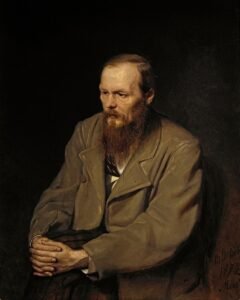Books By Fyodor Dostoevsky
- Poor Folk (1846) – standalone
- The Double (1846) – standalone
- Netochka Nezvanova (1849) – standalone
- Uncle’s Dream (1859) – standalone
- The Village of Stepanchikovo (1859) – standalone
- Humiliated and Insulted (1861) – standalone
- Notes from Underground (1864) – standalone
- Crime and Punishment (1866) – standalone
- The Gambler (1867) – standalone
- The Idiot (1869) – standalone
- The Eternal Husband (1869) – standalone
- Demons (1872) – standalone
- The Adolescent (1875) – standalone
- The Brothers Karamazov (1880) – standalone
About Fyodor Dostoevsky
 Fyodor Dostoevsky, born on November 11, 1821, in Moscow, Russia, was a renowned Russian novelist, philosopher, and journalist whose works have left an indelible mark on world literature. Dostoevsky’s profound exploration of the human psyche, moral dilemmas, and existential questions has earned him a place among the greatest literary figures of all time.
Fyodor Dostoevsky, born on November 11, 1821, in Moscow, Russia, was a renowned Russian novelist, philosopher, and journalist whose works have left an indelible mark on world literature. Dostoevsky’s profound exploration of the human psyche, moral dilemmas, and existential questions has earned him a place among the greatest literary figures of all time.
Dostoevsky’s early life was marked by personal and professional challenges. Raised in a strict Orthodox Christian household, he lost his mother at a young age and was later sent to a military academy. After graduating, he embarked on a career as a writer, initially gaining recognition for his translations of French literature.
Dostoevsky’s literary career took a dramatic turn with the publication of his first novel, “Poor Folk,” in 1846. This early work, written in the form of letters exchanged between two impoverished characters, showcased Dostoevsky’s keen insight into the struggles of the lower classes and established him as a voice of social conscience in Russian literature.
Throughout his career, Dostoevsky grappled with profound existential questions and explored themes of guilt, redemption, and the nature of evil in his writing. His masterpiece, “Crime and Punishment,” published in 1866, is a psychological thriller that delves into the mind of a young student who commits a murder and grapples with the moral consequences of his actions.
Dostoevsky’s other major works include “The Brothers Karamazov,” a sprawling family saga that examines the complexities of faith and doubt, and “The Idiot,” a novel that explores the innocence and idealism of its protagonist amidst the corruption and cynicism of Russian society.
In addition to his novels, Dostoevsky was also a prolific essayist and journalist, writing on a wide range of topics including politics, religion, and philosophy. His keen observations of Russian society and his insights into the human condition continue to resonate with readers around the world.
Dostoevsky’s writing style is characterized by its psychological depth, philosophical complexity, and vivid portrayal of characters and settings. His works are renowned for their exploration of the human soul and their ability to provoke deep introspection and self-examination in readers.
Despite facing personal and financial hardships throughout his life, including periods of imprisonment and exile, Dostoevsky remained dedicated to his craft and continued to produce some of the most enduring works of Russian literature. His legacy as a literary giant and a profound interpreter of the human experience endures, inspiring generations of writers and thinkers with his timeless wisdom and insight.

